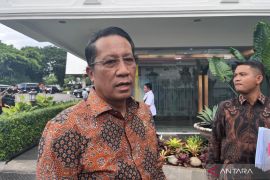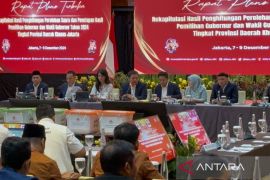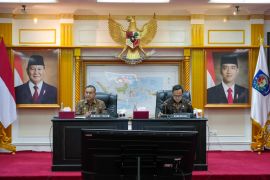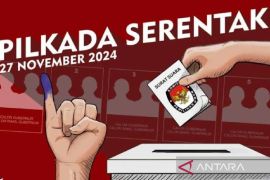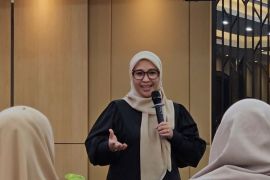They must look into their track records."Jakarta (ANTARA News) - Following a recent ruling of the Indonesia Constitutional Court regarding candidates participating in the regional head elections, some quarters expressed fear that it could lead to the formation of a political dynasty.
On July 8, the court ruled that relatives of incumbent officials are allowed to contest in regional elections.
In its ruling, it stated that article 7 (r) of the law on regional elections, which prohibited relatives of incumbents from running for the positions of regional heads of governments within a certain period, was against the constitution.
Indonesia plans to hold its first simultaneous direct elections on December 9. The elections will be held in 269 regions across the country, including nine gubernatorial elections, 36 mayoral elections and 224 elections for district heads.
Following the Constitutional Courts ruling on the subject, Governor of Central Java Ganjar Pranowo urged the public to watch out for the possible formation of a political dynasty by candidates participating in the elections.
"While the Constitutional Courts verdict must be respected, I believe family members, sons, wives, grandchildren, sisters and brothers will be found in governments later. Let us just wait and see," he remarked.
In addition, Pranowo, who is from the Indonesia Democratic Party of Struggle, called on the people to be smart while voting for district heads and city mayors in the elections in 21 districts and cities in his province.
"They must look into their track records," he added.
Pranowo expressed fear that the worst scenario in the elections could be candidates with strong financial support engaging in money politics to smooth their bids.
However, Governor of Southeast Sulawesi H. Nur Alam expressed his appreciation of the courts ruling, stating, "It is a correct and just decision, not discriminatory."
He pointed out that the verdict was in line with the mandate of the 1945 Constitution that every citizen has a right and an equal position to elect and be elected.
Although he supported the ruling, Alum admitted that he had never thought of allowing his wife or son to participate in the regional elections.
According to Minister of Administrative Reform Yuddy Chrisnandy, whether a political dynasty is formed will depend on the morality of the incumbents.
With good political morality, social sensibility and knowledge of democracy, he believes that incumbents will not allow their family members to run for the positions of regional heads.
With regard to his duty, Chrisnandy affirmed that he will control public servants to ensure their neutrality towards the elections and will issue harsh sanctions if they are found violating regulations.
On July 8, the Constitutional Court fulfilled the demand for a judicial review of article 7 (r) of law number 8 of 2015 on the regional head elections, submitted by Adnan Purichta Ichsan, a member of the South Sulawesi regional legislative assembly.
The court viewed the article, which limits the right of candidates who have family ties with incumbents, violates the constitution. Therefore, it fulfilled the demand of the applicant for its review.
The court believes that ideally, in a democracy, as many people as possible should be allowed to contest in a political process.
Although limitations are needed to ensure that public officials have the required capabilities and capacities, they must not limit the constitutional right of a citizen.
In addition, Justice Patrialis Akbar is of the opinion that article 7 (r) was against article 28 (j) paragraph 2 of the 1945 Constitution.
Vice President Jusuf Kalla has urged Indonesians to respect the courts ruling, which revoked the provision that banned relatives of incumbents from running in the regional elections.
"We respect the courts ruling. However, we hope people elect candidates based on their capabilities, not their family relations," he remarked.
Kalla emphasized that the ruling was final and binding and must be adhered to.
On the fear of the formation of a political dynasty, the vice president noted that there were possibilities of abuse of power even when there were no family relations involved, as reflected in several cases so far.
Furthermore, former chief justice of the Constitutional Court Mahfud M. D. lauded the courts ruling, stating that it was correct because the 1945 Constitution gave every citizen, not family, equal rights.
The applicant, Adnan Purichta Ichsan, who is the son of Gowa District Head Ichsan Yasin Limpo, hailed the courts decision. "What has been decided by the justices of the court is correct. They have been fair," he said.
Ichsan was grateful for the ruling, as a result of which he can run for the next district head elections.
While reading out the verdict, Chief Justice Arief Hidayat said that article 7 (r) on the requirements for candidacy was against the constitutional right to elect and be elected.
He added that the article did not comply with article 28 (i) paragraph 2 of the 1945 Constitution, as well.
Article 7 (r) states: "Indonesian citizens who are eligible to become candidates for the positions of provincial governor and deputy governor, district head and deputy district head, city mayor and deputy city mayor are those who can meet the requirement of having no conflict of interest with incumbents."
Moreover, a former director general of regional autonomy, Djohermansyah Djohan, considers the courts decision a stumbling stone in democracy.
According to data from the Home Affairs Ministry, he added, the practice of building a political dynasty has been found in 61 regions, which is 11 percent of all autonomous regions in the country.
Earlier, the formation of a political dynasty was known as nepotism, where regional heads appointed their relatives in certain positions in the government, legislative assembly or other public offices, Djohan pointed out.
"The law on the regional elections does not ban the practice of forming a political dynasty but limits it by not allowing two-term incumbents to nominate family members for positions," he explained.
Djohan, who is now a lecturer at the Domestic Administration Institute, said that the relatives mentioned in the law are blood relations of or those bound by marriage to incumbents.
According to Coordinator of the Voters Education Network Masykurudin Hafidz, the courts ruling has reduced efforts to increase the quality of democracy in the country.
He added that the ruling had increased the possibility of misappropriation of public funds for illicit campaigning purposes.
However, Deputy House Speaker Agus Hermanto stressed that the courts ruling must be respected and that the Constitutional Court was the institution with the right to decide on a demand for a judicial review.
An evaluation can be carried out after its implementation, if negative impacts are found, he affirmed.
In addition, a political observer from Pelita Harapan University, Victor Silaen, is of the view that everybody has the right to contest in regional elections.
He admitted that the courts ruling reopened the possibility of the emergence of a political dynasty, which would be detrimental to the future of democracy. But whatever be the reason, he reiterated that everybody has the right to participate.
As long as a candidate has a good track record, there would be nothing to worry about. But if a candidate is not good, his/her negative qualities must be exposed to ensure that no one elects him/her.
In view of that, he emphasized the importance of scrutiny to prevent manipulation.
Former chief justice of the Constitutional Court Mahfud M. D. urged the government to prepare a government regulation that gives sanctions to candidates proven to be using state facilities through incumbents to streamline their bids.
"I think the government should make a regulation as a reference to implement the ruling. If a candidate is found to have used an incumbents position to his advantage, his candidacy can be canceled," he noted.
With this government regulation, the Constitutional Court or the General Court would have a reference while dealing with disputes related to elections.
Furthermore, the General Elections Commission (KPU) said that law enforcement will be one of the efforts that could help to prevent the emergence of a political dynasty.
According to Commissioner Ida Budhiati, the core issue behind a political dynasty emerging was an incumbent abusing his/her power for the political interest of his/her relatives.
If enough initial evidence is found, an incumbent state official can be held responsible not only in accordance with criminal law but with a corruption law, as well, she explained.
Budhiati also pointed out that the commission will adjust its regulation to the courts new ruling posthaste, especially to the verdict regarding candidacy.
(T.H-YH/INE/KR-BSR/A014)
Reporter: Yoseph Hariyadi
Editor: Priyambodo RH
Copyright © ANTARA 2015


